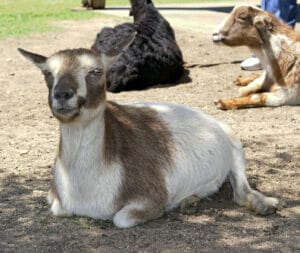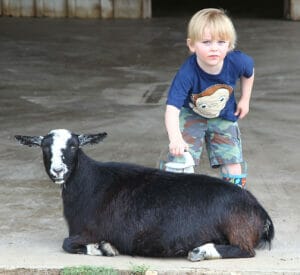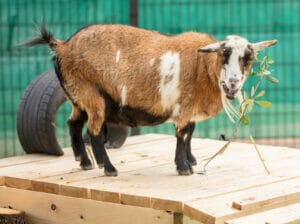
Appearance
The Nigerian dwarf goat is a miniature dairy goat that comes in a wide variety of colors and markings. Both males and females of this species have horns, though it is common for owners to have them removed, or disbudded, at a young age. They have short faces with small, upright ears. As their name suggests, these goats are small, only reaching an average height of 23 inches.
Adaptations
Nigerian dwarfs produce very sweet milk that is high in butterfat and protein. Despite their small size, a healthy female will produce up to two quarts of milk per day. Excess goat milk can be used to raise calves or pigs, since a goat's milk can be used for almost any orphaned animal.
Another benefit of Nigerian dwarf goats is their manure, which can be used as natural compost for gardens, and is virtually odorless.
Due to their small size, they don’t require as much feed or space as larger breeds, making them a good choice as a pet. They also have very friendly and gentle personalities and are easily trained.
Out of Africa
Although the Nigerian dwarf goat is an American breed, it’s descended from the West African dwarf goat. Goats in general are a popular livestock option in Africa thanks to their small size and ease of movement. However, the West African dwarf and many other species have been specifically bred to be resistant to heat, humidity and even some strains of disease. African goat breeds have played an important role in the development of other breeds all around the world, including the pygmy goat in the United Kingdom, the Tibetana goat in Italy and more.
Where are they?
These goats live at Animal Discoveries.
VIEWING TIPS
All of the goats will be interested in being brushed.
Quick Facts
Scientific Name | Capra hircus |
Species Survival Plan | No |
Habitat | Agile climbers that prefer rocky areas |
Food | Herbivorous, eating hay when given and browsing on trees and bushes |
Characteristics | Can be black, brown, gold and cream with many different color patterns; a small goat with upright ears and short hair |
Lifespan | Wild Not Applicable |
Social Behavior | Highly social, live in herds and prefer to stay in family groups |




